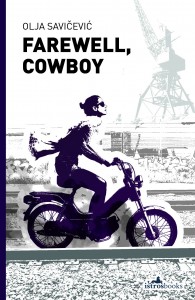 Translated by Celia Hawkesworth
Translated by Celia Hawkesworth
Published by Istros Books 14 April 2015
180pp, paperback, £9.99
Reviewed by Alison Burns
First published in Croatia in 2010, and extracted in Dalkey Archive’s Best European Fiction 2014, Farewell, Cowboy opens in a ferocious heatwave. Red-haired Dada has decided to leave Zagreb and go home. It is 2009.
‘And so I had made it. Yes, I’d made it! I’d returned to my home-town: nothing more than a vast rubbish dump, mud and olive groves, glorious dust, evenings on the empty terrace of the Illyria hotel, heavy metals in the air, excrement and pine-woods, cats and slippery fish scales on the greasy slipway and the sea stretched out as far as November, when the north wind gets up.’
Home is the Old Settlement, beside the Adriatic, where Dada’s widowed mother tends the family grave. Home is memories of childhood games played with her brother Daniel and the local boys from across the tracks, known as the Iroquois Brothers: cowboys and Indians, naturally. Home is also the place where film crews come to shoot ‘real’ Westerns, because it’s cheaper. It was her father who first loved the cowboys; when he became too ill to work at the cement factory, he got a job at the factory cinema. ‘Those were brilliant years for his children,’ especially for Daniel, who daydreamed about the stars.
Now, home is the fevered tourist backdrop for cruise ships full of Japanese and American pensioners: ‘casinos, the mild winds of hashish, the stench of bodies and perfume…girls in high heels squeezed into white nylon and animal skins; clean-shaven lads jiggling the keys of polished cars, their hands smelling of vinyl and genitalia, money and tobacco.’
In this tale of goodies and baddies, Dada is on a hunt of her own, for the truth behind her brother’s sensational suicide. What was going on with the Professor, closet paedophile and porn star? Who exactly was pretty Angelo, in his blue tuxedo?
In this post-war landscape of ‘dessicated orchards’ and ‘roses expiring in stone troughs’, where ethnicity is ‘everybody’s business’, Dada speaks with wrathful melancholy of her people’s self-destructive impulses. Make no mistake, this is a story to give any casual tourist pause. There are no heroes here.
Author Olja Savicevic is an award-winning poet, novelist and short-story writer, and one of Croatia’s best-known authors. In Celia Hawkesworth’s fine translation, her anarchic modern voice leaps off the page.
